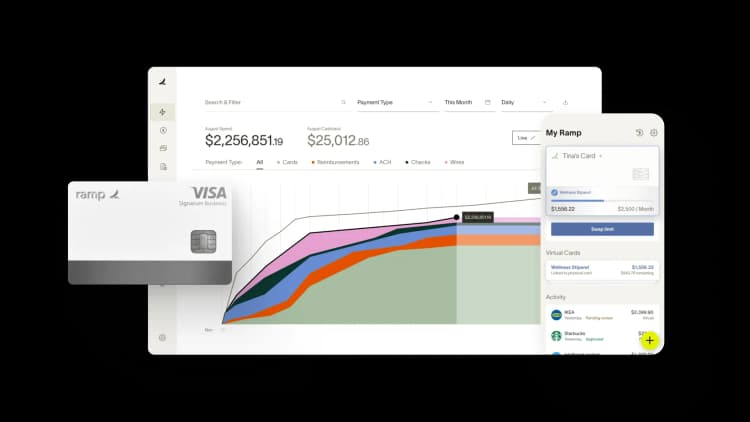Proforma vs. commercial invoice: Which one to use

- Proforma invoice vs. commercial invoice
- Do you always need to transition to a commercial invoice?
- Automate invoices in minutes with Ramp Bill Pay

Choosing between a proforma invoice and a commercial invoice depends on your business needs and where you are in the sales process. While both documents facilitate transactions, they serve very different purposes. Understanding the differences between these two types of invoices ensures your business stays compliant, professional, and efficient.
Proforma invoice vs. commercial invoice
Proforma and commercial invoices are similar, but the key difference lies in their purpose: Proforma invoices are preliminary estimates, while commercial invoices are finalized bills of sale. In more detail:
- Proforma invoice: A draft or estimate of a transaction sent to the buyer before the sale is finalized. It provides a description of the goods or services requested, as well as associated costs and payment terms. Proforma invoices are not legally binding.
- Commercial invoice: The final bill of sale issued after a transaction is confirmed. It acts as a legally binding document and includes detailed information on the goods or services provided, along with accepted payment methods, terms, shipping costs, and estimated delivery dates.
At a glance: Key differences compared
Criteria | Proforma invoice | Commercial invoice |
|---|---|---|
Purpose | Provides a non-binding, preliminary bill for goods or services | Official document that acts as the final invoice |
Timing | Issued before the transaction is finalized | Issued after the transaction is confirmed |
Recordkeeping | Not used for accounting purposes | Required for financial and accounting records |
Content | Includes estimated costs, descriptions, shipping terms | Includes full details of quantities, unit prices, taxes, and total amount |
Customs use | Often used for pre-clearance of international trade | Required for compliance with customs authorities when goods cross international borders |
Personalization | May be customized for specific negotiations | Reflects finalized terms with no room for changes |
Legal status | Preliminary document; not legally binding | Legal document; binding and enforceable |
Proforma invoices are ideal for setting expectations, while commercial invoices are crucial for closing deals, maintaining compliance, and proper invoice processing. Using the correct document ensures smoother business operations and better client relationships.
Do you always need to transition to a commercial invoice?
Not every proforma invoice requires transitioning into a commercial invoice. Proforma invoices are often used in preliminary discussions, especially for international transactions or early negotiations.
However, once a deal is confirmed, a commercial invoice is typically required to finalize the sale and for proper recordkeeping. For international shipments, a commercial invoice is essential for customs clearance and legal compliance. For domestic sales, it depends on the transaction type and legal requirements in your industry.
When in doubt, transitioning to a commercial invoice ensures professionalism, accuracy, and compliance, protecting both your business and your clients.
Automate invoices in minutes with Ramp Bill Pay
Whether proforma or commercial, invoices are essential for managing transactions. Ramp’s modern invoice management software streamlines the entire process, making it faster and more efficient from invoice creation to payment.
Here’s why Ramp Bill Pay makes processing invoices easier:
- Time savings through automation: Automate invoice creation, tracking, and approvals to spend less time on manual tasks
- Seamless integration with ERPs: Sync directly with QuickBooks, NetSuite, and other platforms to keep your financial data connected and accurate
- Real-time visibility into cash flow: Get instant updates on payment statuses, helping you stay on top of your finances
Ramp ensures your invoicing process is efficient and hassle-free. Learn more about how Ramp’s AP automation software has teams doing a month’s worth of AP in minutes.

“In the public sector, every hour and every dollar belongs to the taxpayer. We can't afford to waste either. Ramp ensures we don't.”
Carly Ching
Finance Specialist, City of Ketchum

“Ramp gives us one structured intake, one set of guardrails, and clean data end‑to‑end— that’s how we save 20 hours/month and buy back days at close.”
David Eckstein
CFO, Vanta

“Ramp is the only vendor that can service all of our employees across the globe in one unified system. They handle multiple currencies seamlessly, integrate with all of our accounting systems, and thanks to their customizable card and policy controls, we're compliant worldwide. ”
Brandon Zell
Chief Accounting Officer, Notion

“When our teams need something, they usually need it right away. The more time we can save doing all those tedious tasks, the more time we can dedicate to supporting our student-athletes.”
Sarah Harris
Secretary, The University of Tennessee Athletics Foundation, Inc.

“Ramp had everything we were looking for, and even things we weren't looking for. The policy aspects, that's something I never even dreamed of that a purchasing card program could handle.”
Doug Volesky
Director of Finance, City of Mount Vernon

“Switching from Brex to Ramp wasn't just a platform swap—it was a strategic upgrade that aligned with our mission to be agile, efficient, and financially savvy.”
Lily Liu
CEO, Piñata

“With Ramp, everything lives in one place. You can click into a vendor and see every transaction, invoice, and contract. That didn't exist in Zip. It's made approvals much faster because decision-makers aren't chasing down information—they have it all at their fingertips.”
Ryan Williams
Manager, Contract and Vendor Management, Advisor360°

“The ability to create flexible parameters, such as allowing bookings up to 25% above market rate, has been really good for us. Plus, having all the information within the same platform is really valuable.”
Caroline Hill
Assistant Controller, Sana Benefits



